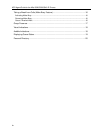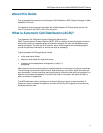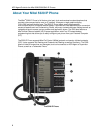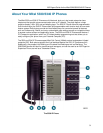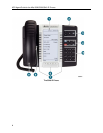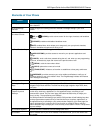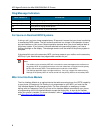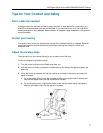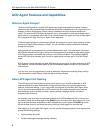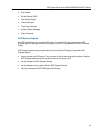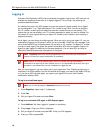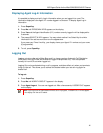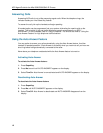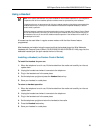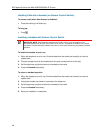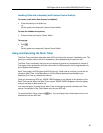
ACD Agent Guide for the Mitel 5320/5330/5340 IP Phones
ACD Agent Features and Capabilities
What are Agent Groups?
Traditional ACD agents or hot desk ACD agents may be grouped together to handle incoming
telephone calls that are associated with particular functions or departments in an organization; for
example, Sales or Engineering. Callers are then directed to the group that best serves their
needs. The formation of ACD agent groups with two or more agents in each group allows calls to
be handled on a group basis rather than on an individual basis. An agent can have multiple Agent
IDs, but agents can login to only one Agent ID per telephone.
Traditional agent groups or hot desk agent groups are assigned a unique 3-digit reporting number
as well as an Agent Group directory number. You will use both of these numbers as discussed
throughout this guide.
Agent groups can be programmed to overflow between each other. This means that if activated,
calls that are directed to one Agent Group can be programmed to overflow to other agent groups
if the first group was unavailable due to being in an overload condition. This overflow capability
allows ACD calls to be handled, even though an agent group has been set in a Do Not Disturb
mode.
ACD Express Groups associate hot desk ACD agents into one group, but take advantage of ACD
Path features, including limited support for RADs, embedded media for music on hold, overflow,
and resilience.
You can have your set programmed to receive additional information concerning Group activity.
This information is called Queue Threshold Alert and Queue Status.
About ACD Agent Hot Desking
The ACD Agent Hot Desking feature allows you to log into any hot desk enabled set or ACD
enabled set and the system automatically configures the set with your personal speed calls,
features, and phone settings. If your user profile is configured as a hot desk ACD agent, when
you log into a hot desk enabled set or ACD enabled set, the system associates your personal
phone settings, such as directory number, system settings, language display, and button
programming with the set.
For example, you could log into a hot desk enabled set or ACD enabled set, dial a number, and
the system stores that number against the Redial key for your set profile. After logging out, if you
log into another hot desk enabled set or ACD enabled set, you can press the Redial key to dial
the last number that you had dialed previously while you were logged into the other set.
After logging in as a hot desk ACD agent, you can use the following personal phone features and
change the following settings:
Call forwarding (all types)
Callback messages (message waiting indicator)
8



